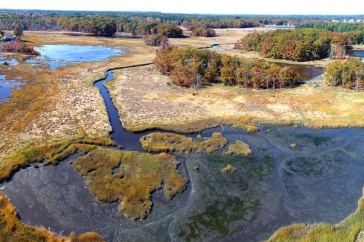
A special issue of the journal "General and Comparative Endocrinology" is highlighting the accomplishments and research legacy of Stacia Sower, professor emeritus of the Department of Molecular, Cellular and Biomedical Sciences and director of the Center for Molecular and Comparative Endocrinology at the UNH College of Life Sciences and Agriculture. The journal reserves the honor for those who are either nearing retirement or currently redefining the discipline.
Associate editor Robert M. Dores and editors-in-chief Deborah Power and Mark Sheridan say Sower belongs to both categories.
Sower's "research productivity over her rather long career has cemented her reputation as a researcher who has profoundly influenced the field of comparative endocrinology,” they write in the issue’s editorial. “During her career she combined her expertise in physiology, cell biology, biochemistry, molecular biology, phylogenetics and molecular evolution to address fundamental questions about the regulation of reproduction in jawless fishes as well as about the evolution of these processes. As a result, she currently is the foremost expert on that subject.”
The issue includes four published articles from Sower and a fifth paper that summarizes her research.
Sower, who came to UNH in 1982, has spent 40 years studying the interaction between the nervous system and the endocrine system and the brain’s control of hormone secretion. The contributions and major breakthroughs in the biological sciences and comparative neuroendocrinology her laboratory has made focus on the neuroendocrine system in lampreys and hagfish.
Among her findings is the discovery that lampreys have a hypothalamic-pituitary axis, which has made the vertebrates a model system for analysis of hormones and respective receptors in all animals that have a backbone or spine.
“One of the ultimate outcomes of the research is to provide critical information that will lead to treatments that produce sterile fish or delay or arrest puberty for use in aquaculture conditions,” says Sower. “Controlling reproduction either by improving efficiency in commercially important species or preventing population increases in invader or unwanted species is of critical importance to farmers and fish and wildlife biologists.”
When Sower learned the journal would be dedicating an issue to her work and achievements, she was surprised and humbled. She says she shares credit with others in the field of comparative endocrinology, including students, lab members and colleagues, who have been a source of support and collaboration.
Describing her “extremely productive career,” Dores, Power and Sheridan laud Sower for her comparative approach to research, thought-provoking presentations, enthusiastic support of her colleagues and dedicated student mentoring.
In 2017, Sower was recognized for her lifelong achievements in endocrinology when she was invited to give the Bargmann-Scharrer lecture at the International Congress of Comparative Endocrinology meeting. She was also the recipient of UNH’s Excellence in Research Award in 2016.
Asked what she’s most proud of, Sower cites her perseverance, the round-the-clock research that helped her secure continuous National Science Foundation and NH Agricultural Experiment Station Hatch funding, and the dedication to her students and laboratory personnel that both supported her work and launched many successful and productive research careers.
“I am honored to have been a member of professor Sower’s laboratory while at UNH,” says Dr. Scott Morin ’14, who graduated from medical school in 2018. “It shaped me as a scientist and instilled in me values that I carry with me to this day.”
The end of her tenure at UNH will bring more time for other interests, including family, golf, volunteer work and travel.
“I currently play in two golf leagues and plan to volunteer my time assisting efforts that keep toxic, endocrine-disrupting chemicals out of our food and water systems,” she says.
One thing is certain: Sower will continue to follow the field of comparative endocrinology, which thanks to her work is far more advanced than when she began her career.
“Comparative endocrinology is an exciting field of study that can make many meaningful contributions to science,” she says. “There is still so much to learn — we are still in the early stages of understanding vertebrate brains at the molecular and cellular levels.”
-
Written By:
Sarah Schaier | College of Life Sciences and Agriculture
















































